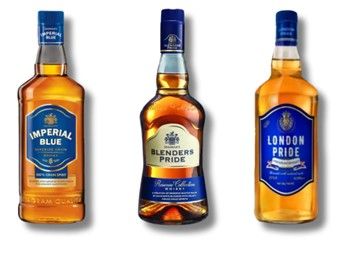- within Intellectual Property topic(s)
- with readers working within the Law Firm industries
- with readers working within the Pharmaceuticals & BioTech industries
The primary issue in this appeal before the Supreme Court is whether Pernod Ricard (the Appellant) is entitled to an interim injunction restraining Karanveer Singh Chhabra (the Respondent) from using the "LONDON PRIDE" trademark and associated trade dress on grounds of trade mark infringement and passing off. The Commercial Court (Indore) and the High Court (of Madhya Pradesh) refused an injunction to the Appellant. The Appellant has challenged the High Court order before the Supreme Court seeking to restrain the Respondent from using the mark "LONDON PRIDE" and packaging. The article summarises the ruling of the Supreme Court and the contention of the parties.
Background and Facts

- The Appellant claims to be a leader in the premium whisky segment. The Appellant sells whisky under the brand names "BLENDERS PRIDE" and "IMPERIAL BLUE", both of which are registered trademarks. The Appellant also holds a registered trademark for "SEAGRAM'S", which serves as the house mark of the Appellant.
- The Appellant claims it has marketed BLENDERS PRIDE since 1995 in India. Over nearly three decades, the brand has achieved high sales volumes and substantial consumer recognition, supported by sustained advertising and promotional efforts.
- The Appellant is aggrieved by Respondent's use of the brand name LONDON PRIDE and trade dress for marketing whisky. The Appellant alleged that the mark adopted by the Respondent was not only phonetically and visually similar to "BLENDERS PRIDE" but also copied the colour combination, get-up, and trade dress of the "IMPERIAL BLUE" label. Additionally, the Appellant alleged that the Respondent used "SEAGRAM'S" embossed bottles for the sale of its LONDON PRIDE whisky, which also amounts to an infringement of the Appellant's registered SEAGRAM'S trademark.
- The suit for trade mark infringement and passing off was initially filed before the Commercial Court (District level), Indore, which refused to grant an interim injunction. The High Court of Madhya Pradesh in an appeal upheld this decision, finding no prima facie case of deceptive similarity of trade marks. The Appellant has now approached the Supreme Court, challenging the order of the High Court in the present appeal.
Contentions of the Parties
The Appellant advanced the following key arguments:
- Prior Rights: The Appellant owns longstanding and reputed whisky brands – BLENDERS PRIDE (registered 1994, in use since 1995), IMPERIAL BLUE (registered 2016, in use since 1997), and SEAGRAM'S (registered since 1945) – all enjoying substantial goodwill in India and abroad. By contrast, the Respondent only entered the market in 2018 with a pending application for LONDON PRIDE.
- Dishonest Adoption: The Respondent's use of LONDON PRIDE is a deliberate attempt to ride on the reputation of the Appellant's marks, amounting to infringement and passing off.
- Similarity and Confusion: LONDON PRIDE is deceptively similar to BLENDERS PRIDE, both cover identical goods (IMFL whisky), sold through the same channels, with "PRIDE" as the dominant and distinctive element. This similarity creates a strong likelihood of confusion or mis-association.
- Errors by Appellate Court: The Court wrongly dissected the mark, comparing "BLENDERS" with "LONDON", ignoring the distinctive and dominant component "PRIDE", thus contrary to the anti-dissection rule and the doctrine of overall similarity. It also overlooked the visual similarities in colour scheme, layout, label, bottle design and overall packaging.
- Publici Juris Flaw: The finding that "PRIDE" is common to trade is unsupported, as no evidence of actual or widespread use was produced. Mere register entries are insufficient to dilute distinctiveness.
- Consumer Perception: The Court erred in assuming IMFL consumers are discerning. However, the test of imperfect recollection applies uniformly, irrespective of a consumer's education, literacy, or economic status. Trademarks are remembered by overall commercial impression, and even minor variations may suggest sub-brands or brand extensions.
- Initial Interest Confusion: The Respondent's use of SEAGRAM'S embossed bottles infringes the Appellant's rights. Even if consumers later realise the difference, the initial attraction caused by similar branding constitutes misappropriation of goodwill.
The Respondent defended its case primarily on the following grounds:
- It asserted exclusive rights over the mark LONDON PRIDE, including its distinctive elements and the goodwill associated with it.
- The brand LONDON PRIDE is duly registered with the Excise Department of Madhya Pradesh.
- Its mark LONDON PRIDE is entirely dissimilar from the Appellant's registered trademarks. It bears no visual, phonetic, or structural resemblance in terms of name, appearance, or composition.
- A holistic comparison of the trademarks and packaging further establishes that the two products are clearly distinguishable. Both parties sell their goods in sealed boxes, not in loose form, and the packaging of each is visually distinct. The colour scheme, typography, logos, and other graphic elements differ significantly. The essential features and the overall visual impression of the marks are therefore dissimilar.
- The Appellants failed to meet the essential requirements for the grant of interim relief, namely, establishing a prima facie case, showing that the balance of convenience lies in their favour, and proving the likelihood of irreparable harm.
Supreme Court's Observations and Decision
The Supreme Court dismissed Pernod Ricard's appeal, refusing to grant an interim injunction, while underlining the following critical principles and observations:
- Overall similarity test prevails – Trademark comparison must be made holistically, considering the overall impression on an average consumer with imperfect recollection, not by dissecting individual elements.
- No deceptive similarity – Applying the anti-dissection rule and consumer perception standard, the Court found no prima facie deceptive similarity between BLENDERS PRIDE / IMPERIAL BLUE and LONDON PRIDE.
- "PRIDE" is non-exclusive – The word "PRIDE" is laudatory, commonly used in the liquor trade, and not registrable or protectable in isolation. The Appellant cannot monopolize it without standalone registration or evidence of acquired distinctiveness.
- Distinctive branding and packaging – The dominant elements (BLENDERS, IMPERIAL BLUE, LONDON), as well as bottle shapes, colour schemes, typography, labels, and cartons, are materially different, leaving negligible scope for consumer confusion.
- Weakness in Appellant's case – The attempt to combine elements from two separate marks (BLENDERS PRIDE and IMPERIAL BLUE) to challenge LONDON PRIDE was held untenable. No evidence was produced to show secondary meaning in the bottle design, colour scheme, or the word "PRIDE".
- Past precedent – The Appellant's earlier challenge to United Spirits' use of "Royal Challenger American Pride" failed, as the Punjab and Haryana High Court held that their rights extended only to the composite mark BLENDERS PRIDE, not to the standalone word "PRIDE".
- Rejection of Embossing Allegation – The Commercial Court rightly dismissed the claim of "Seagram Quality" embossing on the Respondent's bottle, as the Appellant's evidence showed no such feature, and this finding remains unchallenged.
In conclusion, the Supreme Court found no reason to disturb the concurrent findings of the Commercial Court and the High Court, holding that the Appellant had failed to establish a prima facie case of deceptive similarity to justify an interim injunction.
What This Means for Brand Owners
The Supreme Court's refusal to restrain LONDON PRIDE despite Pernod Ricard's established reputation in BLENDERS PRIDE highlights the Court's emphasis on:
- the holistic assessment of trademarks to determine confusion from the perspective of an average consumer with imperfect recollection, and
- the limitations on claiming exclusive rights over common or descriptive terms.
The content of this article is intended to provide a general guide to the subject matter. Specialist advice should be sought about your specific circumstances.
[View Source]

